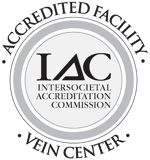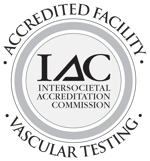When you hear the term vascular surgeon, you may think you only need to see one when you need surgery. However, today’s vascular surgeon does so much more than surgery. Vascular surgeons are specially trained to collaborate with other medical professionals to develop patient-centered care plans.
Each year millions of adults are diagnosed with some form of vascular disease, whether it is blockages or weakening of the blood vessel wall, or other issues impacting the circulatory system. With an aging population and risk factors such as diabetes, high blood pressure, obesity, and smoking, managing your vascular health is becoming even more important.
The Vascular Team
When it comes to your vascular health, today’s vascular surgeon is involved at every step of treatment using a patient-centered model. Modern vascular care encompasses targeted medical therapy, exercise and diet plans, minimally-invasive interventions and traditional surgical procedures. Only vascular surgeons are trained in all of these areas to offer therapy that is best suited for each individual.
As vascular surgeons, we dedicate our entire training to address the full spectrum of vascular health and disease. We are disease-focused rather than technique-focused in our expertise. We are involved at every stage from diagnosis to treatment to continual patient management.
What We Treat
You can rely on a vascular surgeon to diagnose and provide prevention, medical treatment, multiple surgical options and ongoing management if you have some of the following conditions:
⎼ Diabetic Foot
⎼ Non-Healing Wounds
⎼ Gangrene
- Venous Disease
⎼ Chronic Venous Insufficiency
And if you have the following risk factors, then you may benefit from scheduling an appointment with us to better understand your risks and treatment options:
- Atherosclerosis
- Hyperlipidemia
- Hypertension
- Smoking
- Diabetes
- Vasculitis
- Vein Disease
- Leg Pain or Swelling
What Type of Training Does a Vascular Surgeon Receive?
Training to become a vascular surgeon is extensive. It starts off with 4 years of undergraduate school followed by 4 years of medical school. In order to pursue a career in vascular surgery, the medical student must become a surgical resident which is a minimum of 5 years of training.
Being a surgical resident means many hours in the hospital (previously more than 100 hours/week but currently 80hr/week). During these 5 years, the surgical resident is learning how to operate and take care of all types of surgical patients under the guidance of different types of surgeons. It is also not uncommon for residents to take a year or more off to do research in the middle of their surgical training.
At the end of the 5 years of surgical residency, the resident applies for a vascular surgery fellowship. Vascular surgery fellowships are an intense 2 years of further training on only vascular surgery and treating only patients with vascular disease. With that training finished, the resident has already spent the last 15 years learning and training to be a vascular surgeon.
How Should I Choose A Vascular Surgeon?
You must be somewhat savvy in your search for a vascular surgeon. Much as you would choose a specialist for anything else, you should look for the physician who limits their practice to vascular surgery.
These specialists have been trained exclusively to care for problems with the blood vessels. They are not utilizing their knowledge of another body system — for example, the heart or general surgery — and applying it to the vascular system. Only a board-certified vascular surgeon can offer the ability to ‘medicate, dilate (balloon) and operate’ on a patient based on what the best treatment is for the specific disease entity.
Right Care, Right Reason, Right Manner
Choosing the right doctor to handle your vascular disease is an important decision. These days it seems everyone from podiatrists to cardiologists to radiologists are offering various treatments. As vascular doctors, we know we are the most qualified to treat the full spectrum of vein and vascular issues. It is our core focus and our specialty — we do nothing else but treat the vessels of the vascular system. And, we pride ourselves on delivering practical, honest and adept care.
While we have grown into the largest practice in the tri-state area using the latest medical technologies, we still focus on what got us here. We keep to the utmost levels of integrity while instilling a personal, one-on-one approach to medical care. We make you part of the treatment decision process so you can be fully aware of the options available to you.
5 Key Questions to Ask Your Doctor
Our practice has always been dedicated to education and transparency. The field of vascular medicine is evolving and our story continues to focus on improved patient care, better outcomes, collaboration, and leadership. Surgery is only part of what we do. Schedule time with us so we can learn your story and create a meaningful plan for your individual vascular health.









.jpg?width=944&name=Castle-Connolly-Top-Doctors-Emblem-Large%20(4).jpg)